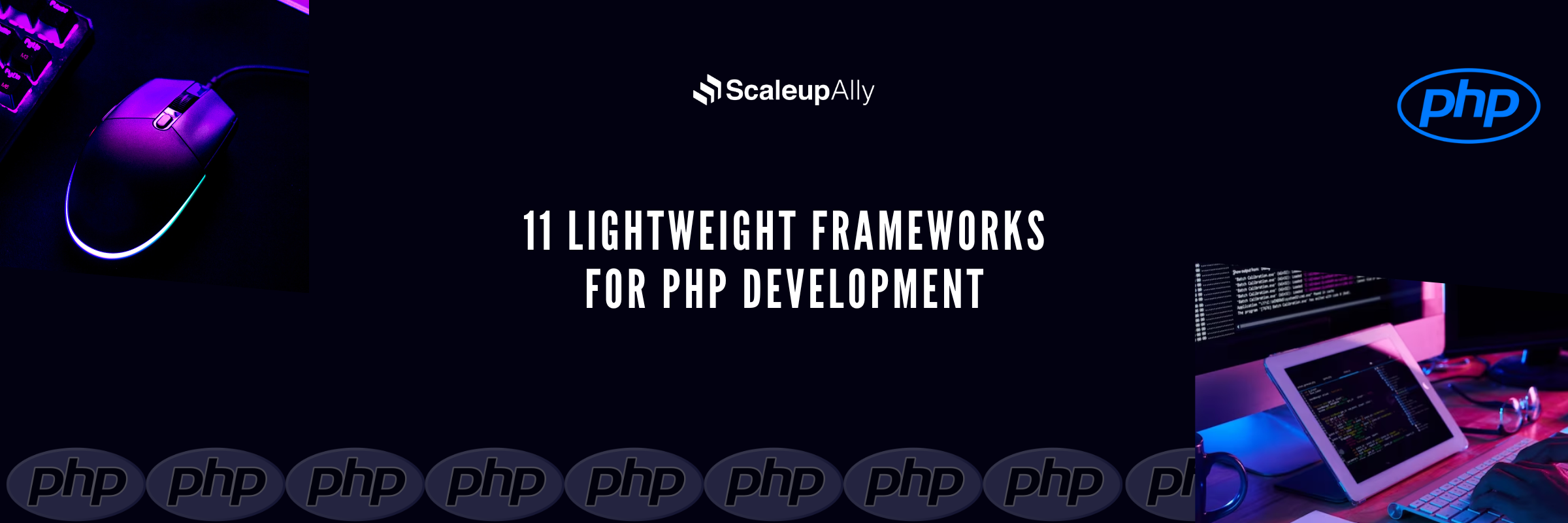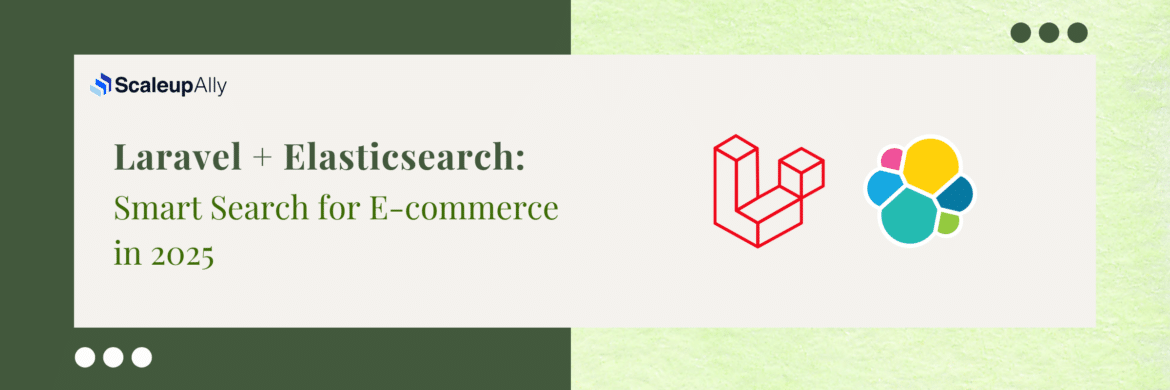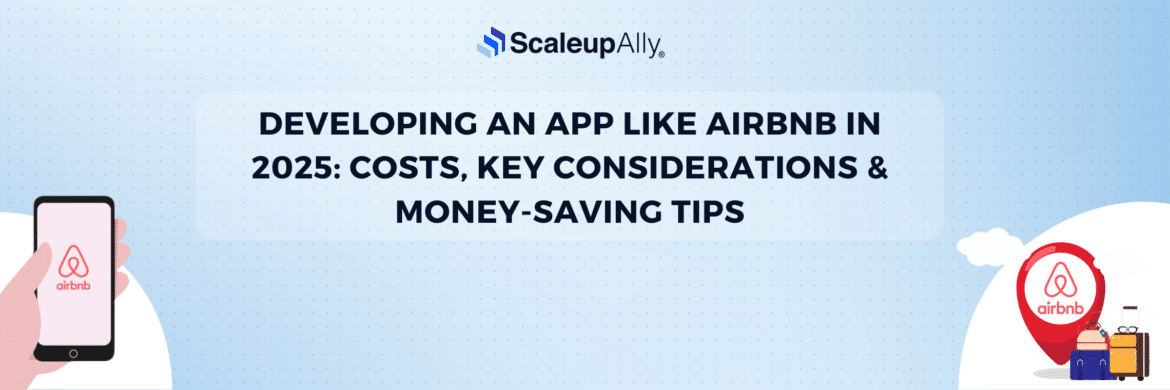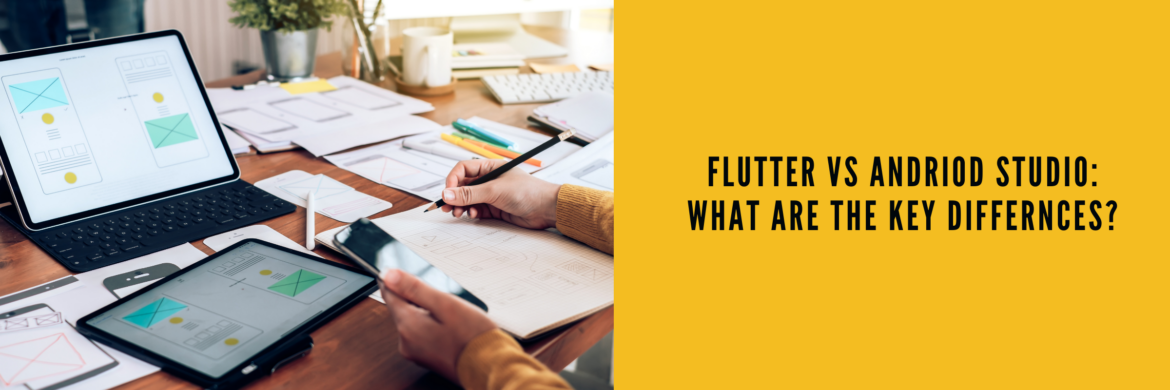
11 Lightweight frameworks for PHP development
Suprabhat Sen | April 3, 2025 , 14 min read
Table Of Content
In the world of web development, choosing the right PHP framework is crucial for creating fast and efficient applications. Lightweight PHP frameworks offer a balance between features and performance, making them an ideal choice for developers who want to build projects quickly without sacrificing functionality.
In this article, we will explore seven of the best lightweight PHP frameworks that can help you streamline your development process and deliver high-quality applications. Whether you are a seasoned PHP developer or just starting out, these frameworks will provide you with the tools and resources you need to create amazing web applications.
Key Takeaways
- Lightweight PHP frameworks offer a balance between features and performance.
- Some of the best lightweight PHP frameworks are Symfony, Silex, Laravel, Laravel Zero, Yii and CodeIgniter.
- Choosing the right PHO framework depends on project requirements, team expertise, and performance needs.
Lightweight PHP Frameworks: A Detailed Comparison
- Lightweight PHP Frameworks: A Detailed Comparison
- 11 Best Lightweight PHP Frameworks
- 1. Symfony: Modular and Extensible
- 2. Silex Framework
- 3. Laravel: Elegant and Scalable
- 4. Laravel Zero
- 5. Yii: Efficient and Secure
- 6. CodeIgniter: Lightweight and Versatile
- 7. Slim: Minimalistic and Fast
- 8. Phalcon: High Performance and Intuitive
- 9. Lumen Framework
- 10. CakePHP
- 11. Medoo
- Benefits of using lightweight PHP frameworks
- How to choose the best lightweight PHP framework?
- Conclusion
- Frequently Asked Questions
| Framework | Popularity | Learning Curve | Performance | Ecosystem | Purpose | Web App |
|---|---|---|---|---|---|---|
| Symfony | High | Moderate | Excellent | Extensive | Modular and Extensible | Buffer: A social media management platform. Expensify: An expense report software. |
| Laravel | Very High | Low | Good | Robust | Elegant and Scalable | Deltanet Travel: A travel management platform. World Walking: A global walking community. |
| Yii | High | Moderate | Excellent | Extensive | Efficient and Secure | Flickr: An image hosting and sharing platform. 2amigos: A development company specializing in Yii. |
| CodeIgniter | Moderate | Low | Good | Limited | Lightweight and Versatile | Buffer: A social media management platform. Expensify: An expense report software. |
| Slim | Low | Low | Good | Limited | Minimalistic and Fast | FreshRSS: A self-hosted RSS aggregator. Status Pages: A status monitoring and reporting service. |
| Phalcon | Low | High | Outstanding | Limited | High Performance and Intuitive | Trackr: A time tracking and invoicing application. StakeIt: A cryptocurrency portfolio tracker. |
| Lumen | Moderate | Low | Good | Laravel-Based | Lightweight for blazing-fast APIs and microservices | Wolt: A food delivery platform. Torch: An e-learning platform for teachers. |
| CakePHP | Moderate | Moderate | Good | Active Community | Full-stack framework emphasizing “Convention over Configuration” to reduce manual setup and speed development | BikerOrNot: A social network for motorcyclists, among others |
| Medoo | Low-Moderate | Low | Good | Minimal | Lightweight database abstraction library for simplified CRUD operations | Often used in smaller projects or microservices that require a clean and simple database layer |
11 Best Lightweight PHP Frameworks
1. Symfony: Modular and Extensible
Symfony is a prominent player in the PHP framework landscape known for its modularity and extensibility. It encourages the use of reusable components, also known as Symfony components, which can be easily integrated into your project. This flexibility makes Symfony suitable for projects of all sizes and natures, from simple websites to complex enterprise-level applications. With its comprehensive documentation and active community, Symfony offers a robust framework that can meet your project requirements
When To Use Symfony?
- Use Symfony for complex, large-scale projects where modularity and extensibility are essential.
- When you want to take advantage of a wide range of reusable Symfony components.
- Ideal for enterprise-level applications with robust security and scalability needs.
2. Silex Framework
Silex is a micro-framework built on top of the Symfony components. It offers a lightweight and flexible approach to web development, allowing developers to create simple yet powerful applications. Silex provides a simple API for defining routes, handling requests, and rendering views. It also leverages the extensive Symfony ecosystem, making it easy to integrate with other Symfony components and libraries.
Key Features of Silex Framework:
- Micro-framework built on Symfony components
- Lightweight and flexible design
- Easy integration with Symfony ecosystem
3. Laravel: Elegant and Scalable
Laravel is one of the most popular PHP frameworks, widely acclaimed for its elegant syntax and comprehensive features. It follows the Model-View-Controller (MVC) architectural pattern, which enables developers to build scalable and maintainable web applications.
Laravel’s robust ecosystem of tools simplifies tasks such as database management, routing, and authentication, making it an ideal choice for both small and large-scale projects. With its expressive syntax and intuitive interface, Laravel empowers developers to write clean and efficient code.
Also Read: Top Benefits of Using Laravel Framework
When To Use Laravel?
- Choose Laravel for web applications of all sizes, from small to large.
- When you need an elegant, developer-friendly framework with rich features.
- Ideal for projects requiring authentication, routing, and database management out of the box.
4. Laravel Zero
Laravel Zero is a lightweight version of the popular Laravel framework. It is specifically designed for building command-line applications and microservices. With a minimalistic approach, Laravel Zero provides a stripped-down version of Laravel, focusing on the essentials needed for command-line development. It offers a robust foundation for building efficient and scalable applications with minimal overhead.
Key Features of Laravel Zero:
- Lightweight and minimalistic design
- Command-line application development
- Built-in support for tasks and commands
5. Yii: Efficient and Secure
Yii is a modern PHP framework designed for developing efficient and secure web applications. It embraces the Don’t Repeat Yourself (DRY) principle and includes a powerful code generation tool called Gii.
Yii is known for its speed and performance, making it an excellent choice for applications that require robust security features. When you hire a PHP developer, ensure they are familiar with Yii to leverage its capabilities for building secure web applications.
When To Use Yii?
- Yii is suitable for projects that require high performance and efficiency.
- When you want to rapidly develop secure web applications following the DRY principle.
- Great for applications with heavy security requirements.
6. CodeIgniter: Lightweight and Versatile
CodeIgniter is a lightweight PHP framework that strikes a perfect balance between features and performance. It is an ideal choice for developers who want to render projects quickly without compromising on functionality.
CodeIgniter’s minimal learning curve and straightforward configuration make it accessible to developers of all skill levels. With its simplicity and speed, CodeIgniter remains a popular choice for building a wide range of web applications.
When To Use CodeIgniter?
- Use CodeIgniter for small to medium-sized projects with a quick development turnaround.
- When you prefer a lightweight framework with a minimal learning curve.
- Ideal for projects where simplicity and speed are essential.
7. Slim: Minimalistic and Fast
If you are looking for a micro-framework that excels in simplicity and speed, Slim Framework is an excellent choice. With a small footprint and minimal dependencies, Slim allows developers to quickly build powerful web applications and APIs.
It provides a fast and efficient routing system, middleware support, and a lightweight template engine. Slim is perfect for small to medium-sized projects that require a lightweight PHP framework.
Key Features of Slim Framework:
- Lightweight and minimalistic design
- Fast and efficient routing system
- Middleware support for extending functionality
When To Use Slim?
- Slim is perfect for building microservices and APIs quickly.
- When you need a minimalistic framework with a lightweight footprint.
- Suitable for small to medium-sized projects that require fast development.
8. Phalcon: High Performance and Intuitive
Phalcon is a full-stack PHP framework known for its exceptional performance and low resource overhead. Unlike traditional PHP frameworks, Phalcon is implemented as a C extension, resulting in unparalleled speed and efficiency. Phalcon offers a rich set of features, including an ORM, a caching system, and support for MVC architecture. If you need a lightweight PHP framework that can handle heavy traffic and high-performance requirements, Phalcon is an excellent choice.
Key Features of Phalcon Framework:
- Implemented as a C extension for exceptional performance
- Rich set of features, including ORM and caching system
- Lightweight and efficient resource utilization
When To Use Phalcon?
- Choose Phalcon for projects that demand high performance and efficiency.
- When you need a full-stack framework with low resource overhead.
- Ideal for applications with heavy traffic and performance requirements.
9. Lumen Framework
Lumen is a micro-framework developed by the creators of Laravel. It is designed for building blazing-fast APIs and microservices. Lumen provides a lightweight and streamlined version of Laravel, optimized for speed and performance. It offers a powerful routing system, support for middleware, and seamless integration with Laravel’s ecosystem. Lumen is an excellent choice for developers who value speed and simplicity in their PHP development projects.
Key Features of Lumen Framework:
- Lightweight and streamlined version of Laravel
- Optimized for building fast APIs and microservices
- Seamless integration with Laravel ecosystem
When To Use Lumen?
- Use Lumen when building blazing-fast APIs and microservices.
- When you want a streamlined version of Laravel optimized for speed.
- Ideal for developers who value simplicity and speed in PHP development.
10. CakePHP
CakePHP is a long-established PHP framework that prioritizes convention over configuration. It streamlines development with its built-in scaffolding, allowing developers to build robust applications quickly. With an active community and a rich set of features, CakePHP is well-suited for teams that value a standardized approach and want to minimize boilerplate code.
Key Features of CakePHP Framework:
- Follows the “Convention over Configuration” principle to reduce manual setup.
- Built-in CRUD scaffolding for rapid application development.
- Strong security features like input validation and CSRF protection.
- Active and supportive community with comprehensive documentation.
When To Use CakePHP?
- When you need a reliable, mature framework with proven stability.
- If you appreciate automatic configurations and built-in scaffolding to speed up development.
- Ideal for projects requiring robust security measures and extensive community support.
11. Medoo
Medoo is a lightweight PHP database framework designed for simplicity and performance. Rather than functioning as a full-stack framework, Medoo focuses solely on database interactions, making it an excellent choice for applications that need a clean and minimalistic database layer. It uses a straightforward API that abstracts away the complexities of raw SQL, offering a smooth and efficient workflow for developers.
Key Features of Medoo Framework:
- Minimalistic design for handling common database operations.
- Single-file implementation for easy installation and updates.
- Supports various SQL databases, including MySQL, PostgreSQL, and SQLite.
- Straightforward API that simplifies CRUD operations.
When To Use Medoo?
- When you need a lightweight database layer without the overhead of a full-stack framework.
- Perfect for smaller projects or microservices that primarily require simple database interactions.
- If you want to quickly integrate a consistent and easy-to-use database abstraction library.
Benefits of using lightweight PHP frameworks
The frameworks mentioned above offer several benefits that make them highly versatile and efficient tools for web development projects.
Some of these benefits are:
- One of the key advantages of using lightweight PHP frameworks is their ability to streamline the development process. These frameworks come with a set of pre-built libraries and tools that simplify common tasks, such as routing, database access, and form validation. This saves developers significant time and effort, allowing them to focus on the core functionality of the application.
- Another benefit of lightweight PHP frameworks is their scalability. These frameworks are designed to handle projects of varying sizes and complexities. Whether you are building a small personal website or a large enterprise application, these frameworks can accommodate your needs. They provide a flexible architecture that can easily adapt to changing requirements and allow for modular development, making it easier to add or remove features as needed.
- Furthermore, lightweight PHP frameworks offer excellent performance. They are optimized for speed and efficiency, ensuring that your web application runs smoothly and responds quickly to user requests. These frameworks use caching mechanisms, database query optimization techniques, and other performance-enhancing features to minimize load times and improve overall performance.
- Security is another area where lightweight PHP frameworks excel. These frameworks have built-in security measures that help protect your web application from common vulnerabilities, such as SQL injection attacks and cross-site scripting (XSS) attacks. They provide features like input validation and output escaping to ensure that user input is properly sanitized before being processed.
How to choose the best lightweight PHP framework?
When it comes to choosing the best lightweight PHP framework, there are several popular options available in the market. Some of the top contenders include Symfony, Laravel, Yii, CodeIgniter, Silexniter, Slim, Phalcon, Lumen, and Laravel Zero.
However, selecting the most suitable framework for your project requires careful consideration of various factors.
- One important factor to consider when choosing a lightweight PHP framework is its performance. You want a framework that can handle your project’s requirements efficiently without sacrificing speed. Symfony and Laravel are known for their impressive performance and scalability, making them popular choices for large-scale applications. On the other hand, Slim and Silexniter are lightweight frameworks that are specifically designed for smaller projects where performance is crucial.
- Another important consideration is the ease of use and learning curve. If you are new to PHP frameworks, you might want to opt for a framework that has extensive documentation and a supportive community. Laravel is well-known for its beginner-friendly nature and vast ecosystem of packages and libraries. Yii is also a good choice for beginners as it offers a simple yet powerful framework with an easy-to-understand code structure.
- Compatibility with third-party libraries and tools is another factor to consider. Symfony, for example, has a strong integration with various libraries and tools, making it a versatile choice for developers who require extensive customization. Phalcon stands out as a high-performance PHP framework that is written in C and offers seamless integration with other PHP modules.
- Lastly, consider the long-term support and stability of the framework. Laravel and Symfony have established themselves as industry-standard frameworks with active communities and regular updates. These frameworks are constantly evolving to adapt to new technologies and security measures. Lumen and Laravel Zero are both lightweight versions of Laravel, focusing on microservices and command-line applications respectively.
Also Read: Can PHP be used with React?
Conclusion
Choosing the best lightweight PHP framework depends on your specific project requirements and preferences. Consider factors such as performance, ease of use, compatibility with third-party tools, and long-term support before making a decision. Ultimately, the right framework will empower you to build efficient and scalable PHP applications
Furthermore, while hiring PHP developers, consider their competence in these frameworks based on your project requirements to ensure a successful development journey. Embrace the power of lightweight PHP frameworks and unlock the potential for fast and efficient web development.
Frequently Asked Questions
Q: Which PHP framework is lightweight?
Good examples of lightweight PHP frameworks include Silex, Slim, Laravel Zero, and Lumen. Silex is a micro-framework, Slim offers simplicity and speed, whereas Laravel Zero is minimalistic for command-line applications, and Lumen is optimized for building fast APIs & microservices.
Q: Which PHP framework is fastest?
Phalcon is known to be the fastest PHP framework for its C extension-based implementation. It results in extracting exceptional performance at a low resource overhead, while still obtaining rich features with high efficiency consistently.
Q: Which PHP framework is the best?
Picking the best PHP framework majorly depends on the project requirements. Laravel is presently well-acclaimed for its comprehensive features and elegant syntax, which suits a variety of projects. Alternatively, Symfony is an ideal pick for large-scale and complex applications because of its extensibility and modularity.
Q: Is Laravel a lightweight framework?
While Laravel is one of the most popular and feature-rich PHP frameworks, it is not typically considered lightweight like micro-frameworks like Slim or Laravel Zero.
Q: Which PHP framework is small footprint?
For a small footprint and fast setup, CodeIgniter is a widely recognized option. Its straightforward configuration and limited overhead helps streamline development without sacrificing essential functionality.
Related Blogs

Laravel + Elasticsearch: Smart Search for E-commerce in 2025
Learn how to integrate Elasticsearch with Laravel, from setup and configuration to indexing. Improve your app's search performance using Laravel Elasticsearch.
ScaleupAlly Team
Jul 3 ,
15 min read

Developing an App Like Airbnb in 2025: Costs, Key Considerations & Money-Saving Tips
Discover the cost to build an app like Airbnb, key factors, app types, and smart ways to optimize development expenses for better ROI.
Suprabhat Sen
Jun 29 ,
10 min read

Flutter vs Android Studio: What are the Key Differences?
Flutter vs Android Studio: Wondering which technology to choose to build your next app. Here is a detailed guide that will help you make a decision.
Suprabhat Sen
Jun 28 ,
14 min read









